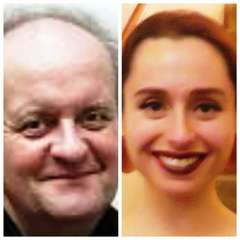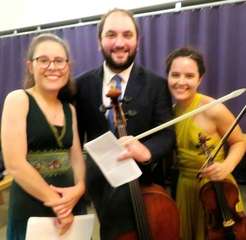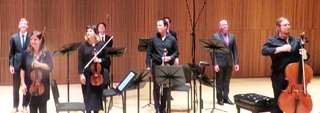|
Back
Poems and Paeans New York
Cary Hall, DiMenna Center
10/19/2019 -
Wolfgang Rihm: 2 short songs after poems by Eduard Mörike: “Life and Death”; “In Camille Paulus’ Birthday Album” – 4 late poems by Friedrich Rückert: “Yesterday was, and tomorrow is not...”; “The Dance Turns relentlessly...”; “World Secret”; “Withered Flower” – Fremde Szene II (Character Piece) – ET LUX
Sophie Delphis (Mezzo-Soprano), Abigel Kralik (Violin), Julian Schwarz (Cello), Hannah Harnest (Piano), Ekmeles: Tim Keeler (Countertenor), Tomás Cruz (Tenor), Jeffrey Gavett (Baritone), Steven Hrycelak (Bass); Mivos Quartet: Olivia De Prato, Maya Bennardo (Violins), Victor Lowrie Tafoya (Viola), Tyler J. Borden (Cello)

W. Rihm/S. Delphis (© Samuel A. Dog)
“One of the most radical figures writing today, precisely because of his superficial conservatism. To those who know his music, he’s someone whose unstoppable musical creativity, whose tumult of pieces for orchestras, opera houses, string quartets...makes him one of the most approachable, engaging and profound composers writing music today.”
The Guardian
“My music is always different from what you think it is.”
Wolfgang Rihm (1952– )
After a decade, the music of Wolfgang Rihm finally made a major appearance in New York last night. That seemed an improbable duration indeed.
First, because nobody can actually avoid the 67-year-old composer, certainly the most prolific living composer. With close to 500 works in every form, one would have thought that any ensembles would relish picking up some of his pieces for performance here. Second, because each work of Mr. Rihm is deft, intricate, accessible, imaginative and different from any others. While my concert experience here has been limited to Light Game: A Summer Piece, other recordings have come my way. And there is no way to predict what will happen.
Yes, the composer studied with Boulez, he had worked with the Darmstadt School, he could be as atonal or dodecaphonic as the best of them. But several decades ago, Mr. Rihm told several interviewers that his music would not or could not be part of any particular temperament. And indeed, while his love for the German and Austrian 19th Century composers is evident, he forms his own geography and his own path.
“When I write music,” he told a British audience, “I do not plan. I do this.” And he reached into the air. Many writers call it “expressionistic”, a useless term. If music doesn’t “express” the composer’s idea, then it fails. And Wolfgang Rihm rarely fails. Even if (as with this listener for one work last night) the expression was bewildering.
Three representatives of his fecundity –vocal, chamber and choral/chamber–were played with some excellent musicians last night. The word “excellent” is redundant, since nothing is simple in Mr. Rihm’s music.
The first two groups of songs were sung with understanding and. above all, grace, by mezzo Sophie Delphis with pianist Hannah Harnest. Ms. Delphis seemed to understand that the lines could be underplayed, that no special drama need be added for the two songs of Eduard Mörike. Thus the Life and Death became a series of questions. For the “birthday gift” of a fading rose, the first verse was almost childlike. Only in the first song of Friedrich Rückert–one of Mahler’s favorite poets–did she rise to the emotional occasion. At other tines, the emotion gave way to speaking a line.
The main effect, though, was the very conservative style. Yes, we had our dissonance, the complex harmonies, but it could have been, almost was like the earliest songs of Schoenberg, Pierrot lunaire-style inspiration without rules. They were all engaging, all, even the philosophical odes of Rückert, gentle, sometimes teasing.
These songs could be heard without any external knowledge. The second of the Fremde Szene (foreign or strange places) didn’t necessitate a guide. Yet it was helpful to know that it was an homage to Robert Schumann, who had always wanted to write a Trio.

H. Harnest, J. Schwarz, A. Kralik
(© Samuel A. Dog)
What we had was an unendingly beautiful (how unusual to use that adjective for a 21st Century piece) and whipsaw trio for violin, cello and piano, which never let up its interest. Yet, oh, how wonderful it was, in that decidedly modern idiom, to find those Schumanneseque phrases, those augmented intervals so characteristic of Schumann’s longings. Any other composer would have hidden a Schumann song or two in the thick harmonies. Mr. Rihm didn’t need to do that.
The whole work was an imitation, a quote in essence, in spirit. And even without that, the work was filled with vigor, with a muscular lyricism. Ms. Harnest again showed her excellent. Both the young Hungarian-American violinist Abigel Kralik and the more experienced Julian Schwarz played with commitment and thorough enjoyment.

Ekmeles and Mivos Quartet
(© Samuel A. Dog)
After the intermission came Mr. Rihm’s “religious work” for voices and string quartet, written originally for the eight voices of the Hilliard Ensemble.
Here only four voices from Ekmeles, and the Mivos Quartet. ET LUX was written for words of the Roman Catholic Requiem Mass. However the words were collected without order, with much repetition. The omitted words were “Amen”, “Hosannah”, “Gloria” and the Greek “Kyrie”.
ET LUX lasted for an hour. The strings played with virtually no vibrato, no counterpoint, moving slowly, clearly. The male voices, including a fine counter-tenor, sung without much passion, perhaps because the harmonies were so dense.
Initially, I listened with care. After 15 minutes, I started to imagine four singing monks and four viol players, going out to the tavern one afternoon, getting totally soused on ale or their own wine. Returning to the monastery realizing they had to sing the next morning.
So for the midnight rehearsal, the music-pages have fallen and picked up higgeldy-piggeldy, the voices are off pitch, the viols slowly playing what they want if it sound religious. It is a quiet cacophony of eight musicians slowly and sacredly singing whatever drunken phrases came to their mind.
And after an hour, they simply go to bed. A scene from Rabelais rather than Rihm.
In north Europe, composers like Arvo Pärt and Georgs Pelēcis write sacred music. But in the Baltic countries, Faith and Religion are part of the landscape. Germany is a secular country, and Mr. Rihm, while delightful to hear, perhaps meant ET LUX as a challenge, not a testament of belief.
Let us hear far far more of Wolfgang Rihm in the future. Of his half-thousand-odd works, we have much from which to choose. With discernment, pleasure and a different fath. Faith in his unerring and singular genius.
Harry Rolnick
|